Entrepreneurship and Innovation in Context
VerifiedAdded on 2020/01/16
|12
|4058
|163
AI Summary
This assignment delves into the multifaceted world of entrepreneurship and innovation, examining their significance within various contexts. It encourages students to analyze current research trends, explore the role of industry and startup experience in entrepreneurial forecasting, and critically evaluate teaching and research methodologies in entrepreneurship education. The focus extends to understanding best practices in university entrepreneurship programs and the impact of social entrepreneurship in sub-Saharan Africa. Furthermore, students will consider the challenges faced by small businesses globally.
Contribute Materials
Your contribution can guide someone’s learning journey. Share your
documents today.

Running head: Entrepreneurship and small business management
ENTREPRENEURSHIP AND SMALL BUSINESS
MANAGEMENT
ENTREPRENEURSHIP AND SMALL BUSINESS
MANAGEMENT
Secure Best Marks with AI Grader
Need help grading? Try our AI Grader for instant feedback on your assignments.
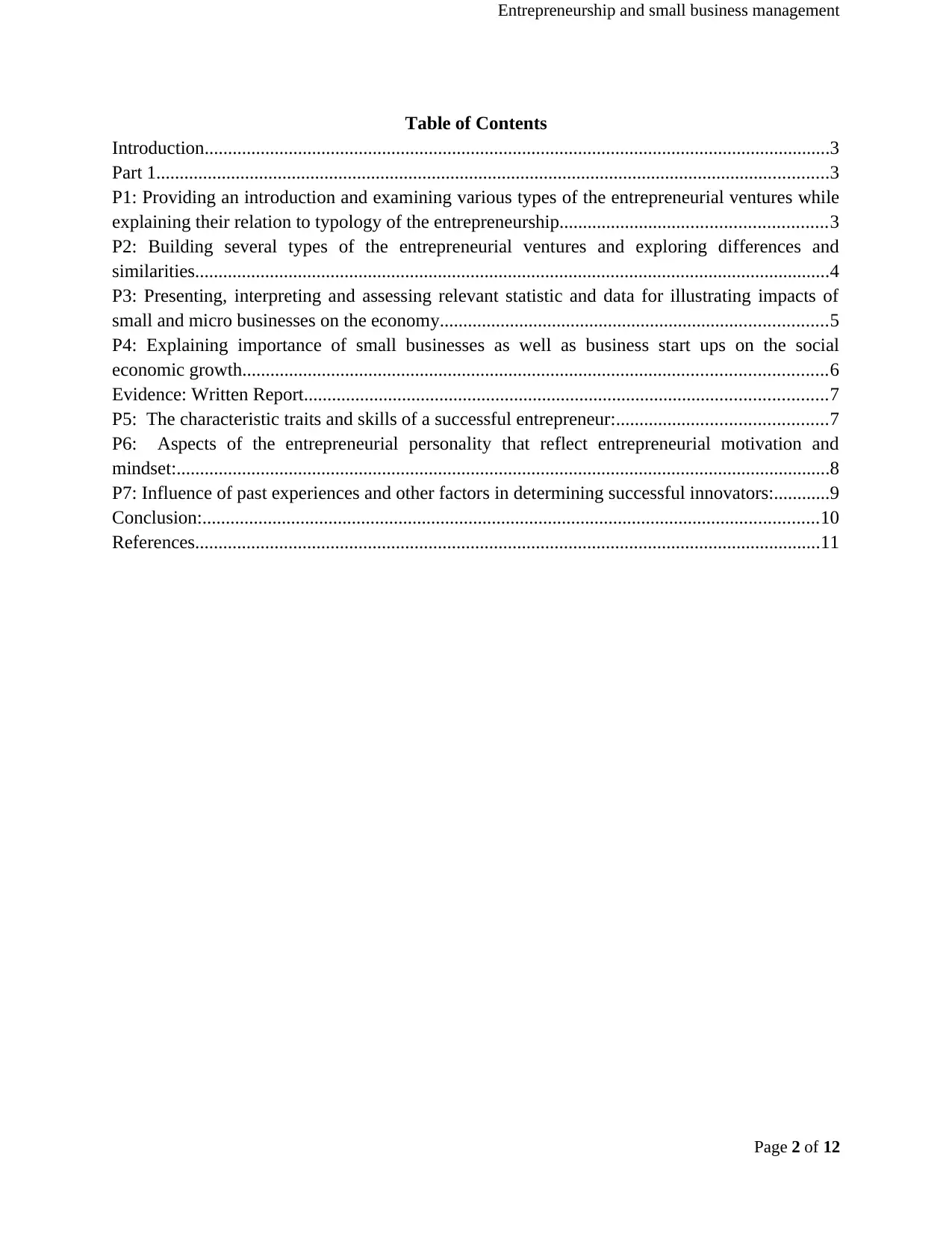
Entrepreneurship and small business management
Table of Contents
Introduction......................................................................................................................................3
Part 1................................................................................................................................................3
P1: Providing an introduction and examining various types of the entrepreneurial ventures while
explaining their relation to typology of the entrepreneurship.........................................................3
P2: Building several types of the entrepreneurial ventures and exploring differences and
similarities........................................................................................................................................4
P3: Presenting, interpreting and assessing relevant statistic and data for illustrating impacts of
small and micro businesses on the economy...................................................................................5
P4: Explaining importance of small businesses as well as business start ups on the social
economic growth.............................................................................................................................6
Evidence: Written Report................................................................................................................7
P5: The characteristic traits and skills of a successful entrepreneur:.............................................7
P6: Aspects of the entrepreneurial personality that reflect entrepreneurial motivation and
mindset:............................................................................................................................................8
P7: Influence of past experiences and other factors in determining successful innovators:............9
Conclusion:....................................................................................................................................10
References......................................................................................................................................11
Page 2 of 12
Table of Contents
Introduction......................................................................................................................................3
Part 1................................................................................................................................................3
P1: Providing an introduction and examining various types of the entrepreneurial ventures while
explaining their relation to typology of the entrepreneurship.........................................................3
P2: Building several types of the entrepreneurial ventures and exploring differences and
similarities........................................................................................................................................4
P3: Presenting, interpreting and assessing relevant statistic and data for illustrating impacts of
small and micro businesses on the economy...................................................................................5
P4: Explaining importance of small businesses as well as business start ups on the social
economic growth.............................................................................................................................6
Evidence: Written Report................................................................................................................7
P5: The characteristic traits and skills of a successful entrepreneur:.............................................7
P6: Aspects of the entrepreneurial personality that reflect entrepreneurial motivation and
mindset:............................................................................................................................................8
P7: Influence of past experiences and other factors in determining successful innovators:............9
Conclusion:....................................................................................................................................10
References......................................................................................................................................11
Page 2 of 12
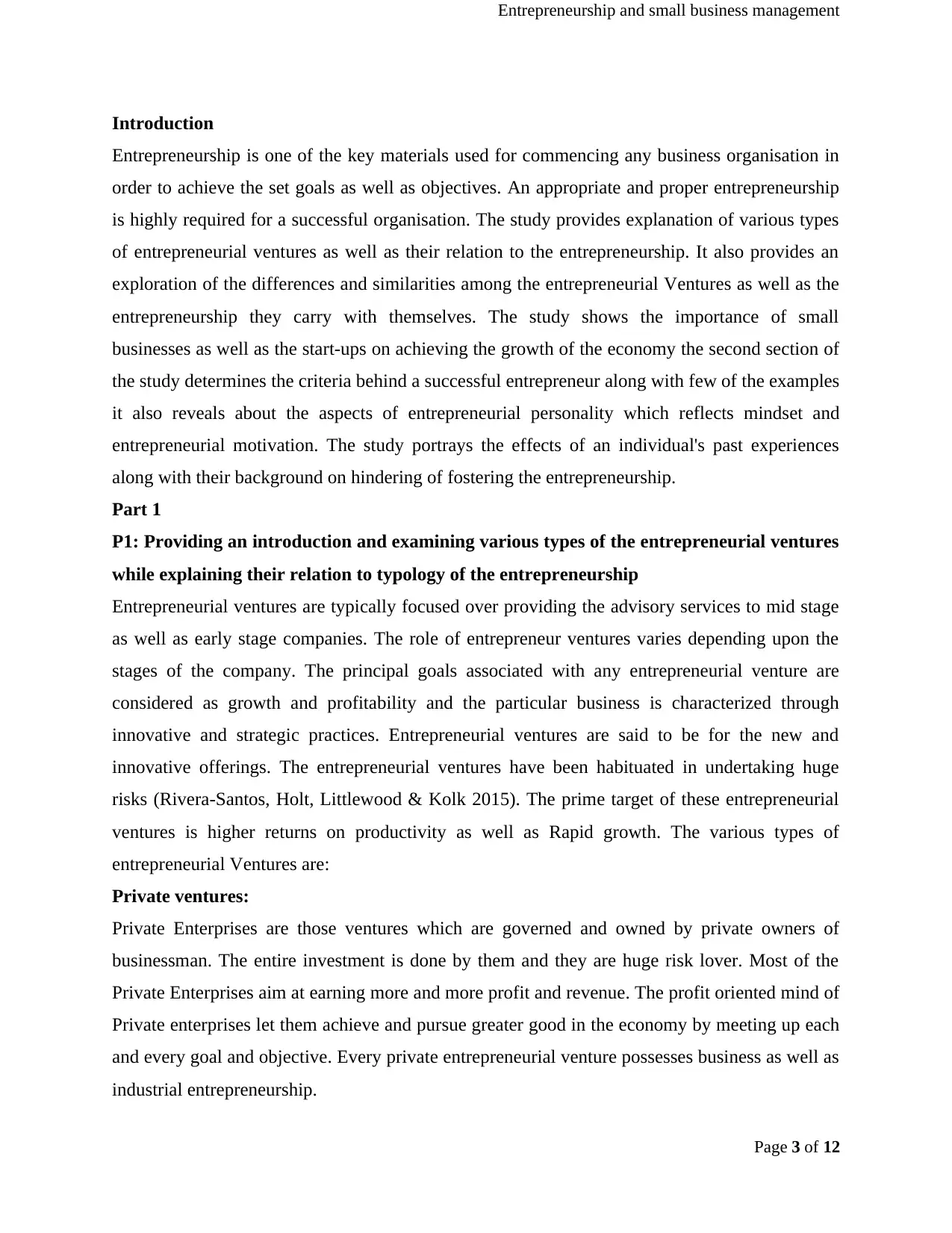
Entrepreneurship and small business management
Introduction
Entrepreneurship is one of the key materials used for commencing any business organisation in
order to achieve the set goals as well as objectives. An appropriate and proper entrepreneurship
is highly required for a successful organisation. The study provides explanation of various types
of entrepreneurial ventures as well as their relation to the entrepreneurship. It also provides an
exploration of the differences and similarities among the entrepreneurial Ventures as well as the
entrepreneurship they carry with themselves. The study shows the importance of small
businesses as well as the start-ups on achieving the growth of the economy the second section of
the study determines the criteria behind a successful entrepreneur along with few of the examples
it also reveals about the aspects of entrepreneurial personality which reflects mindset and
entrepreneurial motivation. The study portrays the effects of an individual's past experiences
along with their background on hindering of fostering the entrepreneurship.
Part 1
P1: Providing an introduction and examining various types of the entrepreneurial ventures
while explaining their relation to typology of the entrepreneurship
Entrepreneurial ventures are typically focused over providing the advisory services to mid stage
as well as early stage companies. The role of entrepreneur ventures varies depending upon the
stages of the company. The principal goals associated with any entrepreneurial venture are
considered as growth and profitability and the particular business is characterized through
innovative and strategic practices. Entrepreneurial ventures are said to be for the new and
innovative offerings. The entrepreneurial ventures have been habituated in undertaking huge
risks (Rivera-Santos, Holt, Littlewood & Kolk 2015). The prime target of these entrepreneurial
ventures is higher returns on productivity as well as Rapid growth. The various types of
entrepreneurial Ventures are:
Private ventures:
Private Enterprises are those ventures which are governed and owned by private owners of
businessman. The entire investment is done by them and they are huge risk lover. Most of the
Private Enterprises aim at earning more and more profit and revenue. The profit oriented mind of
Private enterprises let them achieve and pursue greater good in the economy by meeting up each
and every goal and objective. Every private entrepreneurial venture possesses business as well as
industrial entrepreneurship.
Page 3 of 12
Introduction
Entrepreneurship is one of the key materials used for commencing any business organisation in
order to achieve the set goals as well as objectives. An appropriate and proper entrepreneurship
is highly required for a successful organisation. The study provides explanation of various types
of entrepreneurial ventures as well as their relation to the entrepreneurship. It also provides an
exploration of the differences and similarities among the entrepreneurial Ventures as well as the
entrepreneurship they carry with themselves. The study shows the importance of small
businesses as well as the start-ups on achieving the growth of the economy the second section of
the study determines the criteria behind a successful entrepreneur along with few of the examples
it also reveals about the aspects of entrepreneurial personality which reflects mindset and
entrepreneurial motivation. The study portrays the effects of an individual's past experiences
along with their background on hindering of fostering the entrepreneurship.
Part 1
P1: Providing an introduction and examining various types of the entrepreneurial ventures
while explaining their relation to typology of the entrepreneurship
Entrepreneurial ventures are typically focused over providing the advisory services to mid stage
as well as early stage companies. The role of entrepreneur ventures varies depending upon the
stages of the company. The principal goals associated with any entrepreneurial venture are
considered as growth and profitability and the particular business is characterized through
innovative and strategic practices. Entrepreneurial ventures are said to be for the new and
innovative offerings. The entrepreneurial ventures have been habituated in undertaking huge
risks (Rivera-Santos, Holt, Littlewood & Kolk 2015). The prime target of these entrepreneurial
ventures is higher returns on productivity as well as Rapid growth. The various types of
entrepreneurial Ventures are:
Private ventures:
Private Enterprises are those ventures which are governed and owned by private owners of
businessman. The entire investment is done by them and they are huge risk lover. Most of the
Private Enterprises aim at earning more and more profit and revenue. The profit oriented mind of
Private enterprises let them achieve and pursue greater good in the economy by meeting up each
and every goal and objective. Every private entrepreneurial venture possesses business as well as
industrial entrepreneurship.
Page 3 of 12
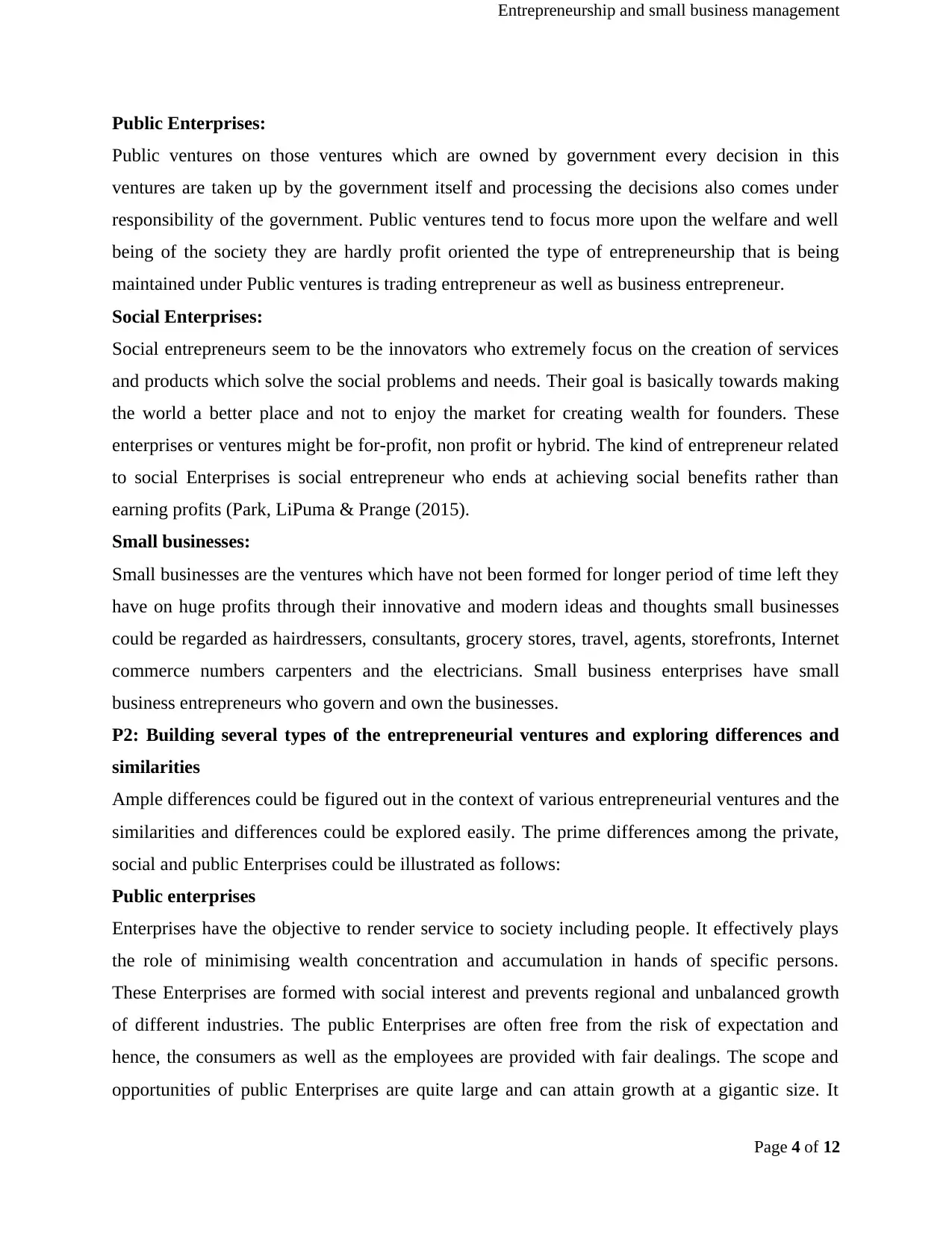
Entrepreneurship and small business management
Public Enterprises:
Public ventures on those ventures which are owned by government every decision in this
ventures are taken up by the government itself and processing the decisions also comes under
responsibility of the government. Public ventures tend to focus more upon the welfare and well
being of the society they are hardly profit oriented the type of entrepreneurship that is being
maintained under Public ventures is trading entrepreneur as well as business entrepreneur.
Social Enterprises:
Social entrepreneurs seem to be the innovators who extremely focus on the creation of services
and products which solve the social problems and needs. Their goal is basically towards making
the world a better place and not to enjoy the market for creating wealth for founders. These
enterprises or ventures might be for-profit, non profit or hybrid. The kind of entrepreneur related
to social Enterprises is social entrepreneur who ends at achieving social benefits rather than
earning profits (Park, LiPuma & Prange (2015).
Small businesses:
Small businesses are the ventures which have not been formed for longer period of time left they
have on huge profits through their innovative and modern ideas and thoughts small businesses
could be regarded as hairdressers, consultants, grocery stores, travel, agents, storefronts, Internet
commerce numbers carpenters and the electricians. Small business enterprises have small
business entrepreneurs who govern and own the businesses.
P2: Building several types of the entrepreneurial ventures and exploring differences and
similarities
Ample differences could be figured out in the context of various entrepreneurial ventures and the
similarities and differences could be explored easily. The prime differences among the private,
social and public Enterprises could be illustrated as follows:
Public enterprises
Enterprises have the objective to render service to society including people. It effectively plays
the role of minimising wealth concentration and accumulation in hands of specific persons.
These Enterprises are formed with social interest and prevents regional and unbalanced growth
of different industries. The public Enterprises are often free from the risk of expectation and
hence, the consumers as well as the employees are provided with fair dealings. The scope and
opportunities of public Enterprises are quite large and can attain growth at a gigantic size. It
Page 4 of 12
Public Enterprises:
Public ventures on those ventures which are owned by government every decision in this
ventures are taken up by the government itself and processing the decisions also comes under
responsibility of the government. Public ventures tend to focus more upon the welfare and well
being of the society they are hardly profit oriented the type of entrepreneurship that is being
maintained under Public ventures is trading entrepreneur as well as business entrepreneur.
Social Enterprises:
Social entrepreneurs seem to be the innovators who extremely focus on the creation of services
and products which solve the social problems and needs. Their goal is basically towards making
the world a better place and not to enjoy the market for creating wealth for founders. These
enterprises or ventures might be for-profit, non profit or hybrid. The kind of entrepreneur related
to social Enterprises is social entrepreneur who ends at achieving social benefits rather than
earning profits (Park, LiPuma & Prange (2015).
Small businesses:
Small businesses are the ventures which have not been formed for longer period of time left they
have on huge profits through their innovative and modern ideas and thoughts small businesses
could be regarded as hairdressers, consultants, grocery stores, travel, agents, storefronts, Internet
commerce numbers carpenters and the electricians. Small business enterprises have small
business entrepreneurs who govern and own the businesses.
P2: Building several types of the entrepreneurial ventures and exploring differences and
similarities
Ample differences could be figured out in the context of various entrepreneurial ventures and the
similarities and differences could be explored easily. The prime differences among the private,
social and public Enterprises could be illustrated as follows:
Public enterprises
Enterprises have the objective to render service to society including people. It effectively plays
the role of minimising wealth concentration and accumulation in hands of specific persons.
These Enterprises are formed with social interest and prevents regional and unbalanced growth
of different industries. The public Enterprises are often free from the risk of expectation and
hence, the consumers as well as the employees are provided with fair dealings. The scope and
opportunities of public Enterprises are quite large and can attain growth at a gigantic size. It
Page 4 of 12
Secure Best Marks with AI Grader
Need help grading? Try our AI Grader for instant feedback on your assignments.
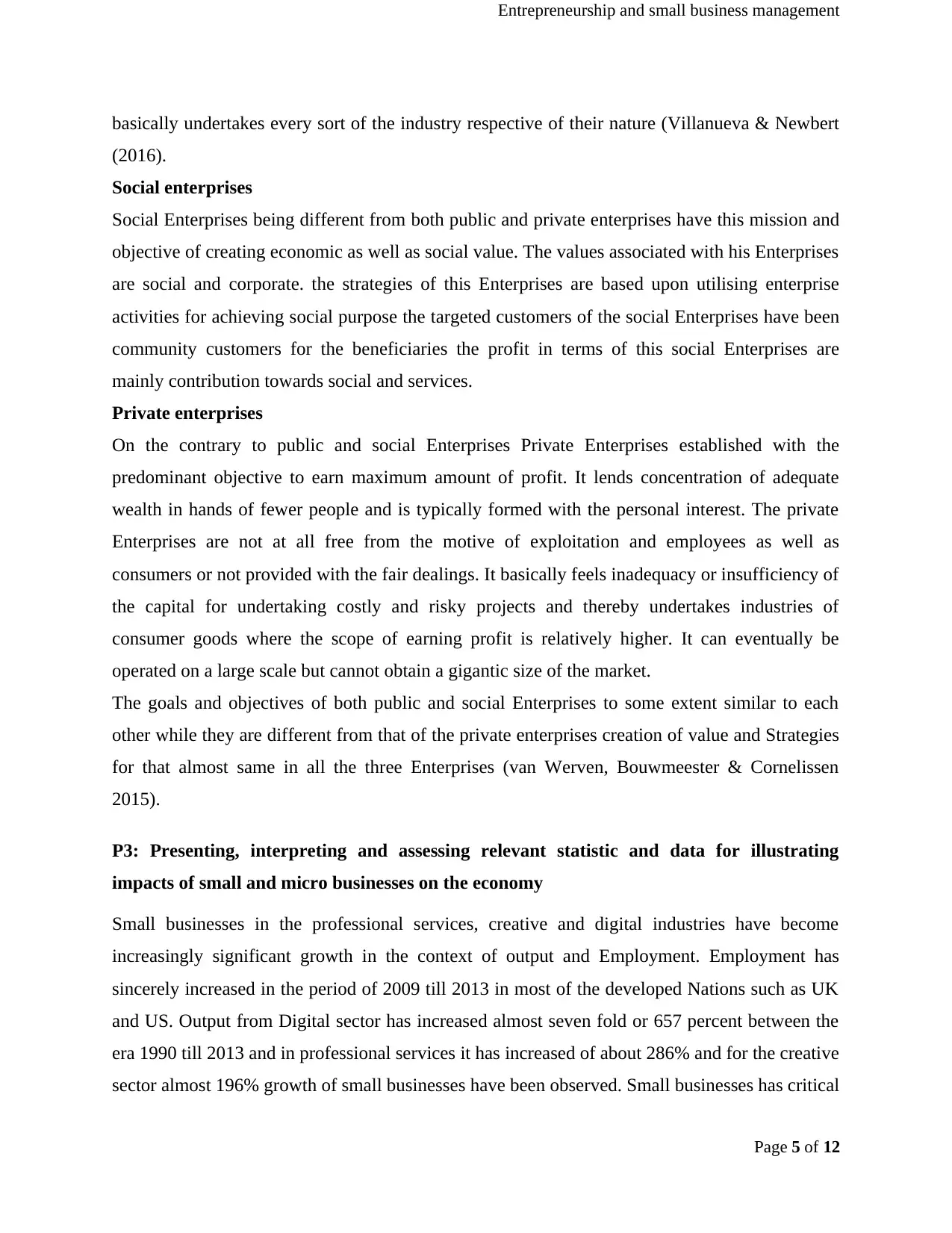
Entrepreneurship and small business management
basically undertakes every sort of the industry respective of their nature (Villanueva & Newbert
(2016).
Social enterprises
Social Enterprises being different from both public and private enterprises have this mission and
objective of creating economic as well as social value. The values associated with his Enterprises
are social and corporate. the strategies of this Enterprises are based upon utilising enterprise
activities for achieving social purpose the targeted customers of the social Enterprises have been
community customers for the beneficiaries the profit in terms of this social Enterprises are
mainly contribution towards social and services.
Private enterprises
On the contrary to public and social Enterprises Private Enterprises established with the
predominant objective to earn maximum amount of profit. It lends concentration of adequate
wealth in hands of fewer people and is typically formed with the personal interest. The private
Enterprises are not at all free from the motive of exploitation and employees as well as
consumers or not provided with the fair dealings. It basically feels inadequacy or insufficiency of
the capital for undertaking costly and risky projects and thereby undertakes industries of
consumer goods where the scope of earning profit is relatively higher. It can eventually be
operated on a large scale but cannot obtain a gigantic size of the market.
The goals and objectives of both public and social Enterprises to some extent similar to each
other while they are different from that of the private enterprises creation of value and Strategies
for that almost same in all the three Enterprises (van Werven, Bouwmeester & Cornelissen
2015).
P3: Presenting, interpreting and assessing relevant statistic and data for illustrating
impacts of small and micro businesses on the economy
Small businesses in the professional services, creative and digital industries have become
increasingly significant growth in the context of output and Employment. Employment has
sincerely increased in the period of 2009 till 2013 in most of the developed Nations such as UK
and US. Output from Digital sector has increased almost seven fold or 657 percent between the
era 1990 till 2013 and in professional services it has increased of about 286% and for the creative
sector almost 196% growth of small businesses have been observed. Small businesses has critical
Page 5 of 12
basically undertakes every sort of the industry respective of their nature (Villanueva & Newbert
(2016).
Social enterprises
Social Enterprises being different from both public and private enterprises have this mission and
objective of creating economic as well as social value. The values associated with his Enterprises
are social and corporate. the strategies of this Enterprises are based upon utilising enterprise
activities for achieving social purpose the targeted customers of the social Enterprises have been
community customers for the beneficiaries the profit in terms of this social Enterprises are
mainly contribution towards social and services.
Private enterprises
On the contrary to public and social Enterprises Private Enterprises established with the
predominant objective to earn maximum amount of profit. It lends concentration of adequate
wealth in hands of fewer people and is typically formed with the personal interest. The private
Enterprises are not at all free from the motive of exploitation and employees as well as
consumers or not provided with the fair dealings. It basically feels inadequacy or insufficiency of
the capital for undertaking costly and risky projects and thereby undertakes industries of
consumer goods where the scope of earning profit is relatively higher. It can eventually be
operated on a large scale but cannot obtain a gigantic size of the market.
The goals and objectives of both public and social Enterprises to some extent similar to each
other while they are different from that of the private enterprises creation of value and Strategies
for that almost same in all the three Enterprises (van Werven, Bouwmeester & Cornelissen
2015).
P3: Presenting, interpreting and assessing relevant statistic and data for illustrating
impacts of small and micro businesses on the economy
Small businesses in the professional services, creative and digital industries have become
increasingly significant growth in the context of output and Employment. Employment has
sincerely increased in the period of 2009 till 2013 in most of the developed Nations such as UK
and US. Output from Digital sector has increased almost seven fold or 657 percent between the
era 1990 till 2013 and in professional services it has increased of about 286% and for the creative
sector almost 196% growth of small businesses have been observed. Small businesses has critical
Page 5 of 12
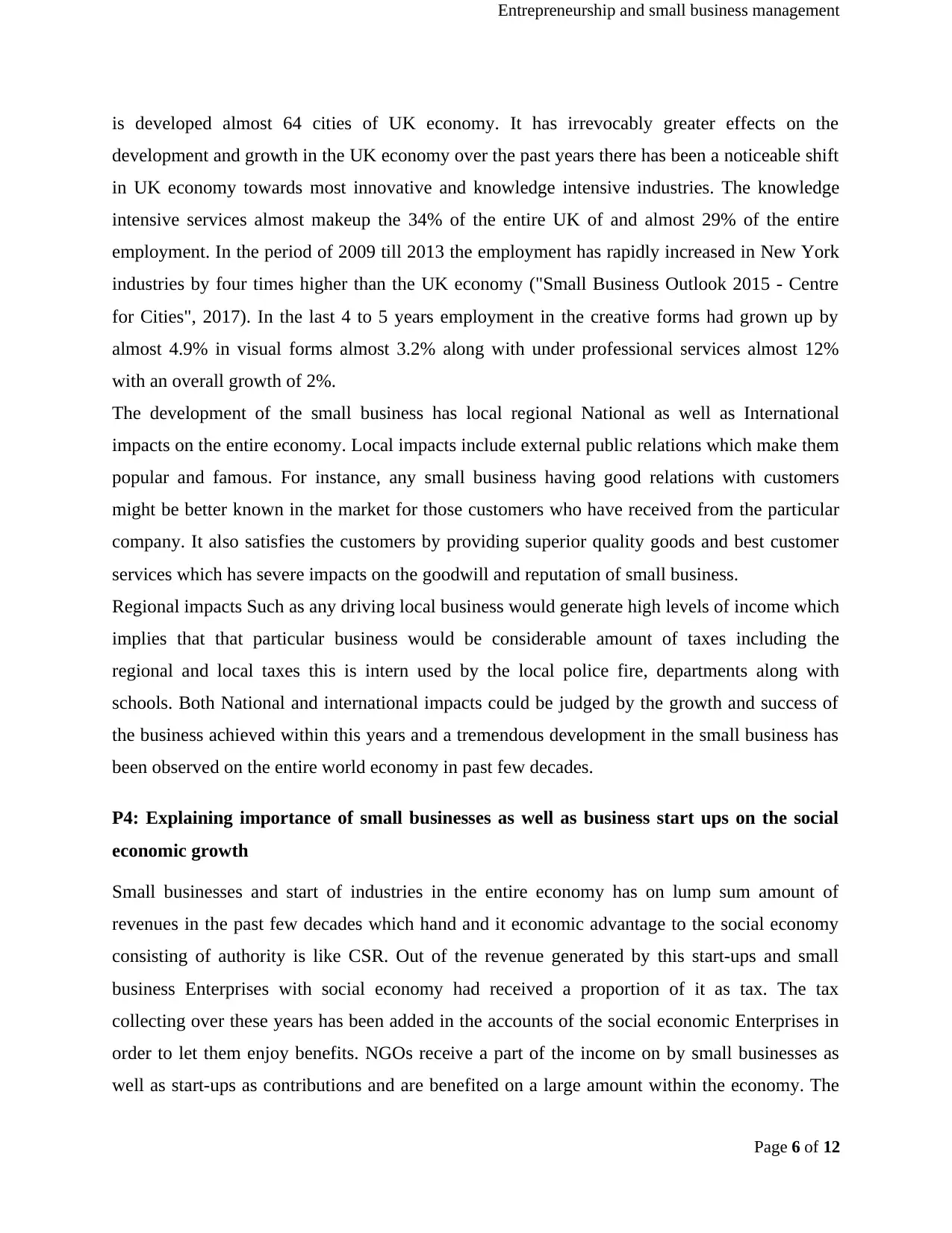
Entrepreneurship and small business management
is developed almost 64 cities of UK economy. It has irrevocably greater effects on the
development and growth in the UK economy over the past years there has been a noticeable shift
in UK economy towards most innovative and knowledge intensive industries. The knowledge
intensive services almost makeup the 34% of the entire UK of and almost 29% of the entire
employment. In the period of 2009 till 2013 the employment has rapidly increased in New York
industries by four times higher than the UK economy ("Small Business Outlook 2015 - Centre
for Cities", 2017). In the last 4 to 5 years employment in the creative forms had grown up by
almost 4.9% in visual forms almost 3.2% along with under professional services almost 12%
with an overall growth of 2%.
The development of the small business has local regional National as well as International
impacts on the entire economy. Local impacts include external public relations which make them
popular and famous. For instance, any small business having good relations with customers
might be better known in the market for those customers who have received from the particular
company. It also satisfies the customers by providing superior quality goods and best customer
services which has severe impacts on the goodwill and reputation of small business.
Regional impacts Such as any driving local business would generate high levels of income which
implies that that particular business would be considerable amount of taxes including the
regional and local taxes this is intern used by the local police fire, departments along with
schools. Both National and international impacts could be judged by the growth and success of
the business achieved within this years and a tremendous development in the small business has
been observed on the entire world economy in past few decades.
P4: Explaining importance of small businesses as well as business start ups on the social
economic growth
Small businesses and start of industries in the entire economy has on lump sum amount of
revenues in the past few decades which hand and it economic advantage to the social economy
consisting of authority is like CSR. Out of the revenue generated by this start-ups and small
business Enterprises with social economy had received a proportion of it as tax. The tax
collecting over these years has been added in the accounts of the social economic Enterprises in
order to let them enjoy benefits. NGOs receive a part of the income on by small businesses as
well as start-ups as contributions and are benefited on a large amount within the economy. The
Page 6 of 12
is developed almost 64 cities of UK economy. It has irrevocably greater effects on the
development and growth in the UK economy over the past years there has been a noticeable shift
in UK economy towards most innovative and knowledge intensive industries. The knowledge
intensive services almost makeup the 34% of the entire UK of and almost 29% of the entire
employment. In the period of 2009 till 2013 the employment has rapidly increased in New York
industries by four times higher than the UK economy ("Small Business Outlook 2015 - Centre
for Cities", 2017). In the last 4 to 5 years employment in the creative forms had grown up by
almost 4.9% in visual forms almost 3.2% along with under professional services almost 12%
with an overall growth of 2%.
The development of the small business has local regional National as well as International
impacts on the entire economy. Local impacts include external public relations which make them
popular and famous. For instance, any small business having good relations with customers
might be better known in the market for those customers who have received from the particular
company. It also satisfies the customers by providing superior quality goods and best customer
services which has severe impacts on the goodwill and reputation of small business.
Regional impacts Such as any driving local business would generate high levels of income which
implies that that particular business would be considerable amount of taxes including the
regional and local taxes this is intern used by the local police fire, departments along with
schools. Both National and international impacts could be judged by the growth and success of
the business achieved within this years and a tremendous development in the small business has
been observed on the entire world economy in past few decades.
P4: Explaining importance of small businesses as well as business start ups on the social
economic growth
Small businesses and start of industries in the entire economy has on lump sum amount of
revenues in the past few decades which hand and it economic advantage to the social economy
consisting of authority is like CSR. Out of the revenue generated by this start-ups and small
business Enterprises with social economy had received a proportion of it as tax. The tax
collecting over these years has been added in the accounts of the social economic Enterprises in
order to let them enjoy benefits. NGOs receive a part of the income on by small businesses as
well as start-ups as contributions and are benefited on a large amount within the economy. The
Page 6 of 12
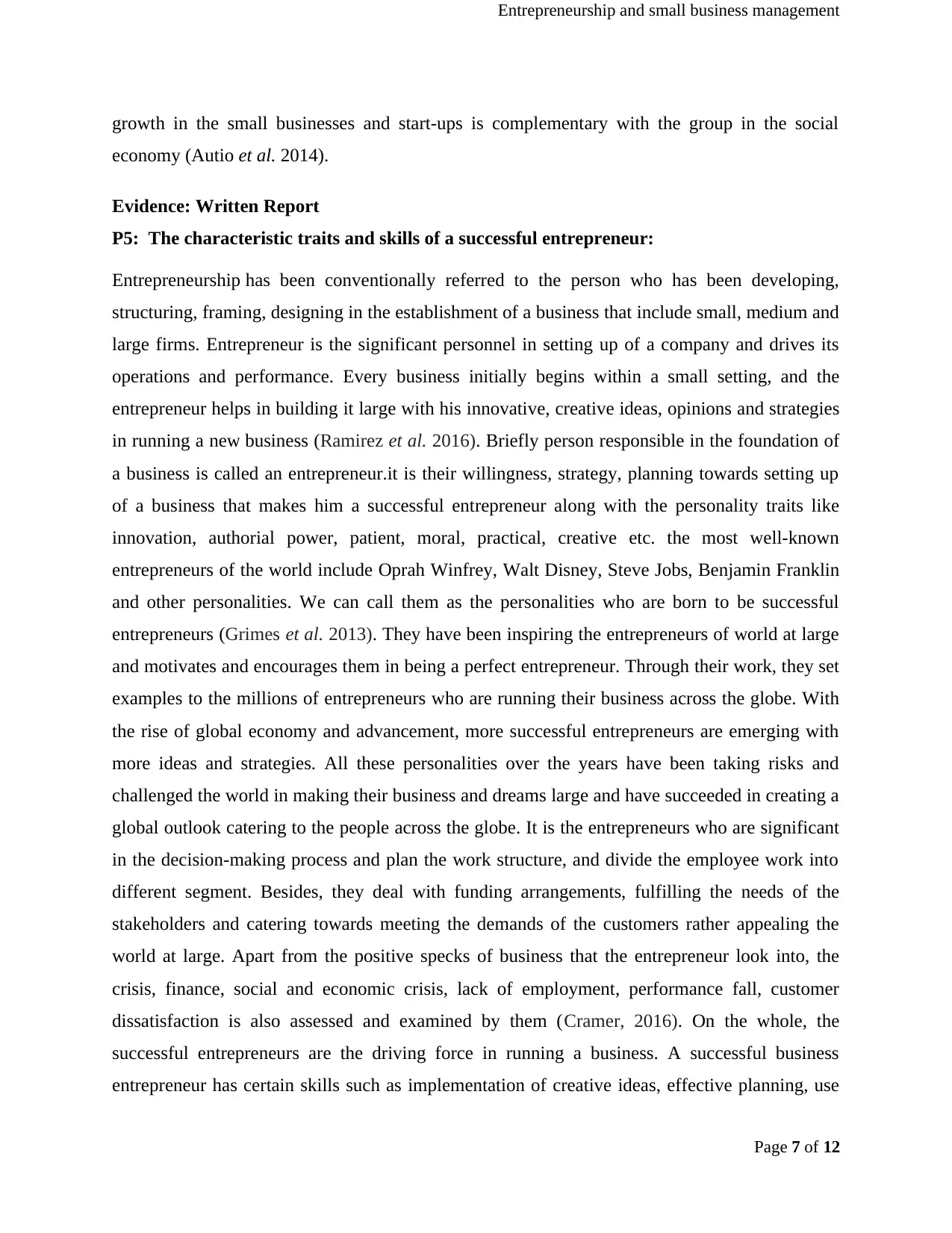
Entrepreneurship and small business management
growth in the small businesses and start-ups is complementary with the group in the social
economy (Autio et al. 2014).
Evidence: Written Report
P5: The characteristic traits and skills of a successful entrepreneur:
Entrepreneurship has been conventionally referred to the person who has been developing,
structuring, framing, designing in the establishment of a business that include small, medium and
large firms. Entrepreneur is the significant personnel in setting up of a company and drives its
operations and performance. Every business initially begins within a small setting, and the
entrepreneur helps in building it large with his innovative, creative ideas, opinions and strategies
in running a new business (Ramirez et al. 2016). Briefly person responsible in the foundation of
a business is called an entrepreneur.it is their willingness, strategy, planning towards setting up
of a business that makes him a successful entrepreneur along with the personality traits like
innovation, authorial power, patient, moral, practical, creative etc. the most well-known
entrepreneurs of the world include Oprah Winfrey, Walt Disney, Steve Jobs, Benjamin Franklin
and other personalities. We can call them as the personalities who are born to be successful
entrepreneurs (Grimes et al. 2013). They have been inspiring the entrepreneurs of world at large
and motivates and encourages them in being a perfect entrepreneur. Through their work, they set
examples to the millions of entrepreneurs who are running their business across the globe. With
the rise of global economy and advancement, more successful entrepreneurs are emerging with
more ideas and strategies. All these personalities over the years have been taking risks and
challenged the world in making their business and dreams large and have succeeded in creating a
global outlook catering to the people across the globe. It is the entrepreneurs who are significant
in the decision-making process and plan the work structure, and divide the employee work into
different segment. Besides, they deal with funding arrangements, fulfilling the needs of the
stakeholders and catering towards meeting the demands of the customers rather appealing the
world at large. Apart from the positive specks of business that the entrepreneur look into, the
crisis, finance, social and economic crisis, lack of employment, performance fall, customer
dissatisfaction is also assessed and examined by them (Cramer, 2016). On the whole, the
successful entrepreneurs are the driving force in running a business. A successful business
entrepreneur has certain skills such as implementation of creative ideas, effective planning, use
Page 7 of 12
growth in the small businesses and start-ups is complementary with the group in the social
economy (Autio et al. 2014).
Evidence: Written Report
P5: The characteristic traits and skills of a successful entrepreneur:
Entrepreneurship has been conventionally referred to the person who has been developing,
structuring, framing, designing in the establishment of a business that include small, medium and
large firms. Entrepreneur is the significant personnel in setting up of a company and drives its
operations and performance. Every business initially begins within a small setting, and the
entrepreneur helps in building it large with his innovative, creative ideas, opinions and strategies
in running a new business (Ramirez et al. 2016). Briefly person responsible in the foundation of
a business is called an entrepreneur.it is their willingness, strategy, planning towards setting up
of a business that makes him a successful entrepreneur along with the personality traits like
innovation, authorial power, patient, moral, practical, creative etc. the most well-known
entrepreneurs of the world include Oprah Winfrey, Walt Disney, Steve Jobs, Benjamin Franklin
and other personalities. We can call them as the personalities who are born to be successful
entrepreneurs (Grimes et al. 2013). They have been inspiring the entrepreneurs of world at large
and motivates and encourages them in being a perfect entrepreneur. Through their work, they set
examples to the millions of entrepreneurs who are running their business across the globe. With
the rise of global economy and advancement, more successful entrepreneurs are emerging with
more ideas and strategies. All these personalities over the years have been taking risks and
challenged the world in making their business and dreams large and have succeeded in creating a
global outlook catering to the people across the globe. It is the entrepreneurs who are significant
in the decision-making process and plan the work structure, and divide the employee work into
different segment. Besides, they deal with funding arrangements, fulfilling the needs of the
stakeholders and catering towards meeting the demands of the customers rather appealing the
world at large. Apart from the positive specks of business that the entrepreneur look into, the
crisis, finance, social and economic crisis, lack of employment, performance fall, customer
dissatisfaction is also assessed and examined by them (Cramer, 2016). On the whole, the
successful entrepreneurs are the driving force in running a business. A successful business
entrepreneur has certain skills such as implementation of creative ideas, effective planning, use
Page 7 of 12
Paraphrase This Document
Need a fresh take? Get an instant paraphrase of this document with our AI Paraphraser
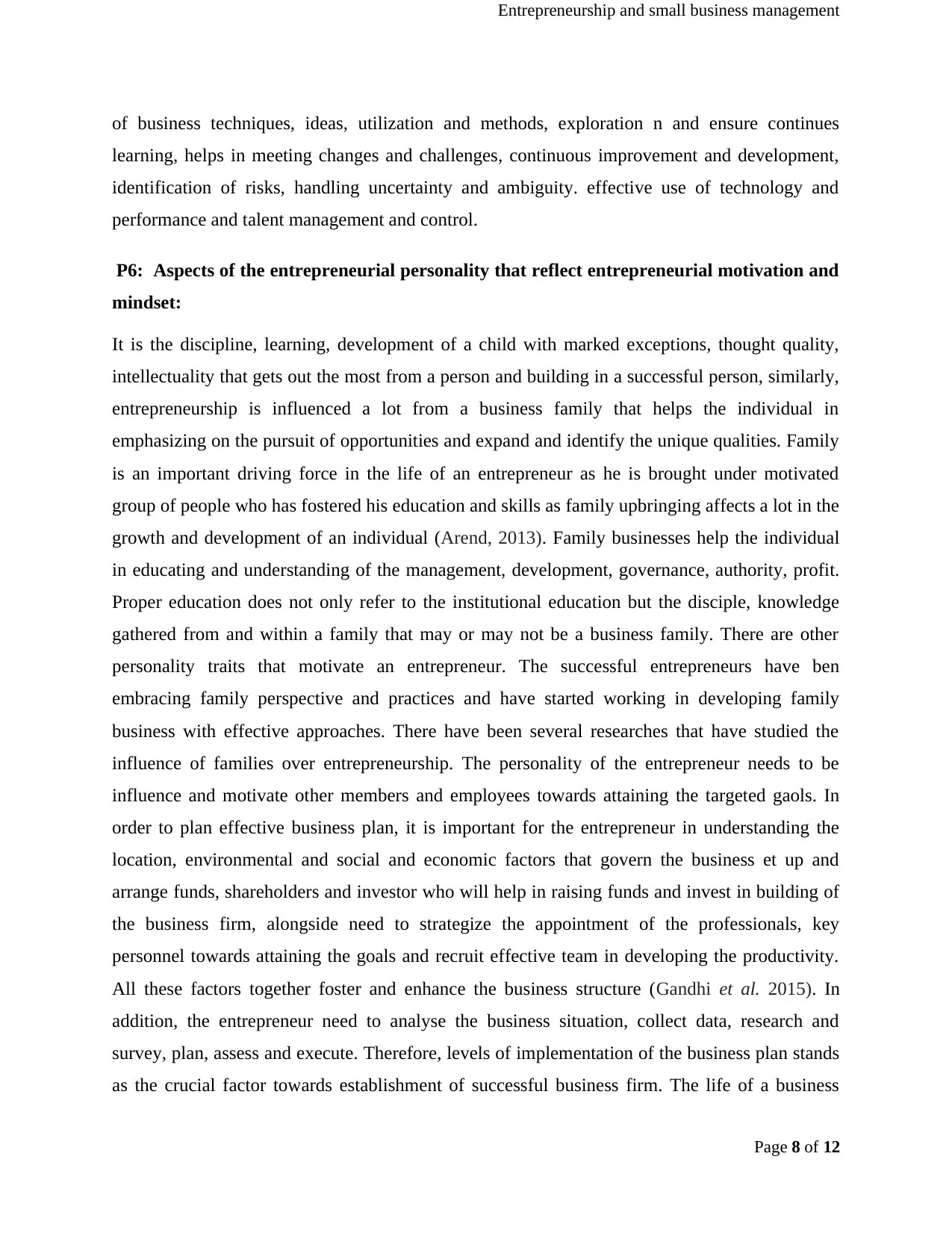
Entrepreneurship and small business management
of business techniques, ideas, utilization and methods, exploration n and ensure continues
learning, helps in meeting changes and challenges, continuous improvement and development,
identification of risks, handling uncertainty and ambiguity. effective use of technology and
performance and talent management and control.
P6: Aspects of the entrepreneurial personality that reflect entrepreneurial motivation and
mindset:
It is the discipline, learning, development of a child with marked exceptions, thought quality,
intellectuality that gets out the most from a person and building in a successful person, similarly,
entrepreneurship is influenced a lot from a business family that helps the individual in
emphasizing on the pursuit of opportunities and expand and identify the unique qualities. Family
is an important driving force in the life of an entrepreneur as he is brought under motivated
group of people who has fostered his education and skills as family upbringing affects a lot in the
growth and development of an individual (Arend, 2013). Family businesses help the individual
in educating and understanding of the management, development, governance, authority, profit.
Proper education does not only refer to the institutional education but the disciple, knowledge
gathered from and within a family that may or may not be a business family. There are other
personality traits that motivate an entrepreneur. The successful entrepreneurs have ben
embracing family perspective and practices and have started working in developing family
business with effective approaches. There have been several researches that have studied the
influence of families over entrepreneurship. The personality of the entrepreneur needs to be
influence and motivate other members and employees towards attaining the targeted gaols. In
order to plan effective business plan, it is important for the entrepreneur in understanding the
location, environmental and social and economic factors that govern the business et up and
arrange funds, shareholders and investor who will help in raising funds and invest in building of
the business firm, alongside need to strategize the appointment of the professionals, key
personnel towards attaining the goals and recruit effective team in developing the productivity.
All these factors together foster and enhance the business structure (Gandhi et al. 2015). In
addition, the entrepreneur need to analyse the business situation, collect data, research and
survey, plan, assess and execute. Therefore, levels of implementation of the business plan stands
as the crucial factor towards establishment of successful business firm. The life of a business
Page 8 of 12
of business techniques, ideas, utilization and methods, exploration n and ensure continues
learning, helps in meeting changes and challenges, continuous improvement and development,
identification of risks, handling uncertainty and ambiguity. effective use of technology and
performance and talent management and control.
P6: Aspects of the entrepreneurial personality that reflect entrepreneurial motivation and
mindset:
It is the discipline, learning, development of a child with marked exceptions, thought quality,
intellectuality that gets out the most from a person and building in a successful person, similarly,
entrepreneurship is influenced a lot from a business family that helps the individual in
emphasizing on the pursuit of opportunities and expand and identify the unique qualities. Family
is an important driving force in the life of an entrepreneur as he is brought under motivated
group of people who has fostered his education and skills as family upbringing affects a lot in the
growth and development of an individual (Arend, 2013). Family businesses help the individual
in educating and understanding of the management, development, governance, authority, profit.
Proper education does not only refer to the institutional education but the disciple, knowledge
gathered from and within a family that may or may not be a business family. There are other
personality traits that motivate an entrepreneur. The successful entrepreneurs have ben
embracing family perspective and practices and have started working in developing family
business with effective approaches. There have been several researches that have studied the
influence of families over entrepreneurship. The personality of the entrepreneur needs to be
influence and motivate other members and employees towards attaining the targeted gaols. In
order to plan effective business plan, it is important for the entrepreneur in understanding the
location, environmental and social and economic factors that govern the business et up and
arrange funds, shareholders and investor who will help in raising funds and invest in building of
the business firm, alongside need to strategize the appointment of the professionals, key
personnel towards attaining the goals and recruit effective team in developing the productivity.
All these factors together foster and enhance the business structure (Gandhi et al. 2015). In
addition, the entrepreneur need to analyse the business situation, collect data, research and
survey, plan, assess and execute. Therefore, levels of implementation of the business plan stands
as the crucial factor towards establishment of successful business firm. The life of a business
Page 8 of 12
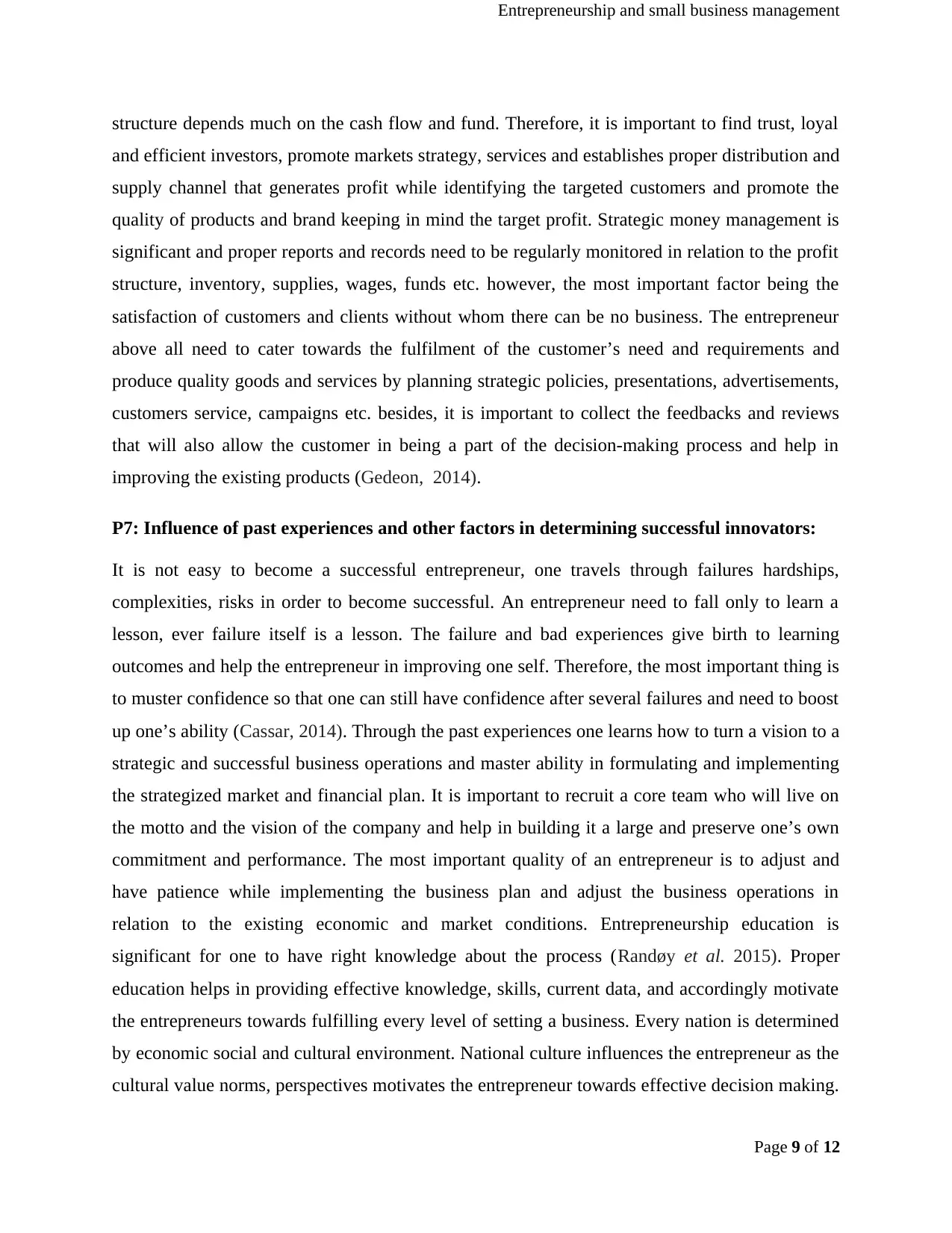
Entrepreneurship and small business management
structure depends much on the cash flow and fund. Therefore, it is important to find trust, loyal
and efficient investors, promote markets strategy, services and establishes proper distribution and
supply channel that generates profit while identifying the targeted customers and promote the
quality of products and brand keeping in mind the target profit. Strategic money management is
significant and proper reports and records need to be regularly monitored in relation to the profit
structure, inventory, supplies, wages, funds etc. however, the most important factor being the
satisfaction of customers and clients without whom there can be no business. The entrepreneur
above all need to cater towards the fulfilment of the customer’s need and requirements and
produce quality goods and services by planning strategic policies, presentations, advertisements,
customers service, campaigns etc. besides, it is important to collect the feedbacks and reviews
that will also allow the customer in being a part of the decision-making process and help in
improving the existing products (Gedeon, 2014).
P7: Influence of past experiences and other factors in determining successful innovators:
It is not easy to become a successful entrepreneur, one travels through failures hardships,
complexities, risks in order to become successful. An entrepreneur need to fall only to learn a
lesson, ever failure itself is a lesson. The failure and bad experiences give birth to learning
outcomes and help the entrepreneur in improving one self. Therefore, the most important thing is
to muster confidence so that one can still have confidence after several failures and need to boost
up one’s ability (Cassar, 2014). Through the past experiences one learns how to turn a vision to a
strategic and successful business operations and master ability in formulating and implementing
the strategized market and financial plan. It is important to recruit a core team who will live on
the motto and the vision of the company and help in building it a large and preserve one’s own
commitment and performance. The most important quality of an entrepreneur is to adjust and
have patience while implementing the business plan and adjust the business operations in
relation to the existing economic and market conditions. Entrepreneurship education is
significant for one to have right knowledge about the process (Randøy et al. 2015). Proper
education helps in providing effective knowledge, skills, current data, and accordingly motivate
the entrepreneurs towards fulfilling every level of setting a business. Every nation is determined
by economic social and cultural environment. National culture influences the entrepreneur as the
cultural value norms, perspectives motivates the entrepreneur towards effective decision making.
Page 9 of 12
structure depends much on the cash flow and fund. Therefore, it is important to find trust, loyal
and efficient investors, promote markets strategy, services and establishes proper distribution and
supply channel that generates profit while identifying the targeted customers and promote the
quality of products and brand keeping in mind the target profit. Strategic money management is
significant and proper reports and records need to be regularly monitored in relation to the profit
structure, inventory, supplies, wages, funds etc. however, the most important factor being the
satisfaction of customers and clients without whom there can be no business. The entrepreneur
above all need to cater towards the fulfilment of the customer’s need and requirements and
produce quality goods and services by planning strategic policies, presentations, advertisements,
customers service, campaigns etc. besides, it is important to collect the feedbacks and reviews
that will also allow the customer in being a part of the decision-making process and help in
improving the existing products (Gedeon, 2014).
P7: Influence of past experiences and other factors in determining successful innovators:
It is not easy to become a successful entrepreneur, one travels through failures hardships,
complexities, risks in order to become successful. An entrepreneur need to fall only to learn a
lesson, ever failure itself is a lesson. The failure and bad experiences give birth to learning
outcomes and help the entrepreneur in improving one self. Therefore, the most important thing is
to muster confidence so that one can still have confidence after several failures and need to boost
up one’s ability (Cassar, 2014). Through the past experiences one learns how to turn a vision to a
strategic and successful business operations and master ability in formulating and implementing
the strategized market and financial plan. It is important to recruit a core team who will live on
the motto and the vision of the company and help in building it a large and preserve one’s own
commitment and performance. The most important quality of an entrepreneur is to adjust and
have patience while implementing the business plan and adjust the business operations in
relation to the existing economic and market conditions. Entrepreneurship education is
significant for one to have right knowledge about the process (Randøy et al. 2015). Proper
education helps in providing effective knowledge, skills, current data, and accordingly motivate
the entrepreneurs towards fulfilling every level of setting a business. Every nation is determined
by economic social and cultural environment. National culture influences the entrepreneur as the
cultural value norms, perspectives motivates the entrepreneur towards effective decision making.
Page 9 of 12
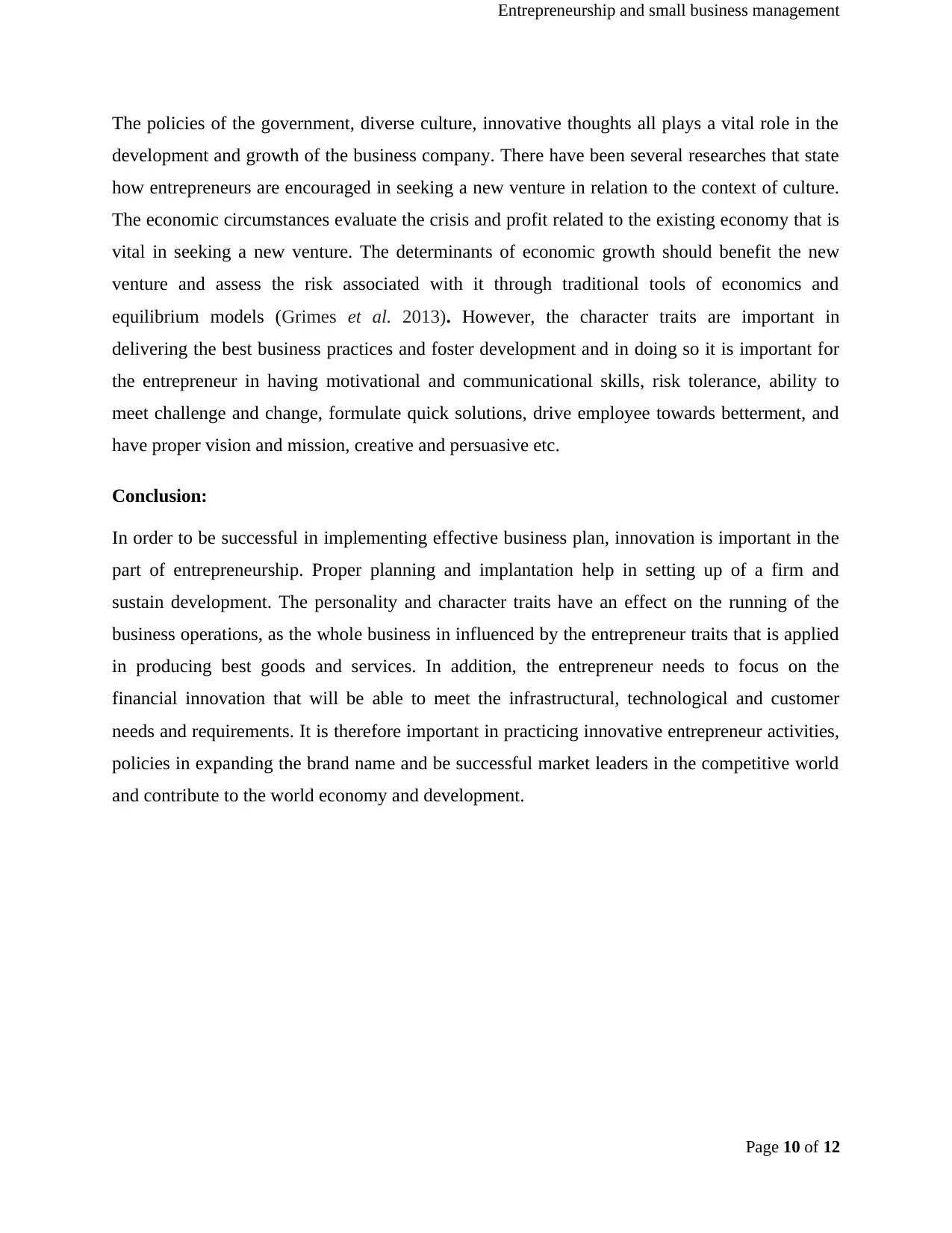
Entrepreneurship and small business management
The policies of the government, diverse culture, innovative thoughts all plays a vital role in the
development and growth of the business company. There have been several researches that state
how entrepreneurs are encouraged in seeking a new venture in relation to the context of culture.
The economic circumstances evaluate the crisis and profit related to the existing economy that is
vital in seeking a new venture. The determinants of economic growth should benefit the new
venture and assess the risk associated with it through traditional tools of economics and
equilibrium models (Grimes et al. 2013). However, the character traits are important in
delivering the best business practices and foster development and in doing so it is important for
the entrepreneur in having motivational and communicational skills, risk tolerance, ability to
meet challenge and change, formulate quick solutions, drive employee towards betterment, and
have proper vision and mission, creative and persuasive etc.
Conclusion:
In order to be successful in implementing effective business plan, innovation is important in the
part of entrepreneurship. Proper planning and implantation help in setting up of a firm and
sustain development. The personality and character traits have an effect on the running of the
business operations, as the whole business in influenced by the entrepreneur traits that is applied
in producing best goods and services. In addition, the entrepreneur needs to focus on the
financial innovation that will be able to meet the infrastructural, technological and customer
needs and requirements. It is therefore important in practicing innovative entrepreneur activities,
policies in expanding the brand name and be successful market leaders in the competitive world
and contribute to the world economy and development.
Page 10 of 12
The policies of the government, diverse culture, innovative thoughts all plays a vital role in the
development and growth of the business company. There have been several researches that state
how entrepreneurs are encouraged in seeking a new venture in relation to the context of culture.
The economic circumstances evaluate the crisis and profit related to the existing economy that is
vital in seeking a new venture. The determinants of economic growth should benefit the new
venture and assess the risk associated with it through traditional tools of economics and
equilibrium models (Grimes et al. 2013). However, the character traits are important in
delivering the best business practices and foster development and in doing so it is important for
the entrepreneur in having motivational and communicational skills, risk tolerance, ability to
meet challenge and change, formulate quick solutions, drive employee towards betterment, and
have proper vision and mission, creative and persuasive etc.
Conclusion:
In order to be successful in implementing effective business plan, innovation is important in the
part of entrepreneurship. Proper planning and implantation help in setting up of a firm and
sustain development. The personality and character traits have an effect on the running of the
business operations, as the whole business in influenced by the entrepreneur traits that is applied
in producing best goods and services. In addition, the entrepreneur needs to focus on the
financial innovation that will be able to meet the infrastructural, technological and customer
needs and requirements. It is therefore important in practicing innovative entrepreneur activities,
policies in expanding the brand name and be successful market leaders in the competitive world
and contribute to the world economy and development.
Page 10 of 12
Secure Best Marks with AI Grader
Need help grading? Try our AI Grader for instant feedback on your assignments.
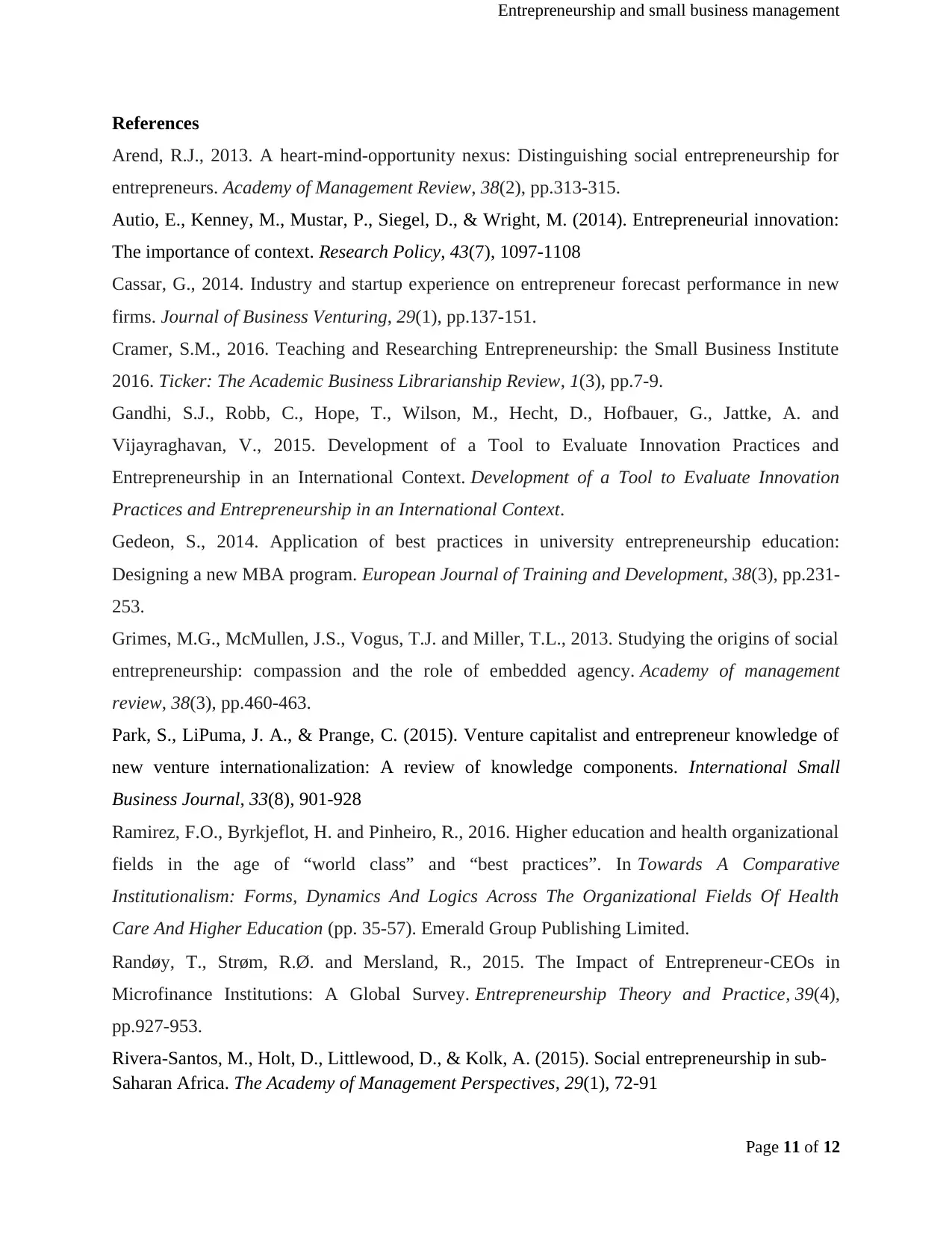
Entrepreneurship and small business management
References
Arend, R.J., 2013. A heart-mind-opportunity nexus: Distinguishing social entrepreneurship for
entrepreneurs. Academy of Management Review, 38(2), pp.313-315.
Autio, E., Kenney, M., Mustar, P., Siegel, D., & Wright, M. (2014). Entrepreneurial innovation:
The importance of context. Research Policy, 43(7), 1097-1108
Cassar, G., 2014. Industry and startup experience on entrepreneur forecast performance in new
firms. Journal of Business Venturing, 29(1), pp.137-151.
Cramer, S.M., 2016. Teaching and Researching Entrepreneurship: the Small Business Institute
2016. Ticker: The Academic Business Librarianship Review, 1(3), pp.7-9.
Gandhi, S.J., Robb, C., Hope, T., Wilson, M., Hecht, D., Hofbauer, G., Jattke, A. and
Vijayraghavan, V., 2015. Development of a Tool to Evaluate Innovation Practices and
Entrepreneurship in an International Context. Development of a Tool to Evaluate Innovation
Practices and Entrepreneurship in an International Context.
Gedeon, S., 2014. Application of best practices in university entrepreneurship education:
Designing a new MBA program. European Journal of Training and Development, 38(3), pp.231-
253.
Grimes, M.G., McMullen, J.S., Vogus, T.J. and Miller, T.L., 2013. Studying the origins of social
entrepreneurship: compassion and the role of embedded agency. Academy of management
review, 38(3), pp.460-463.
Park, S., LiPuma, J. A., & Prange, C. (2015). Venture capitalist and entrepreneur knowledge of
new venture internationalization: A review of knowledge components. International Small
Business Journal, 33(8), 901-928
Ramirez, F.O., Byrkjeflot, H. and Pinheiro, R., 2016. Higher education and health organizational
fields in the age of “world class” and “best practices”. In Towards A Comparative
Institutionalism: Forms, Dynamics And Logics Across The Organizational Fields Of Health
Care And Higher Education (pp. 35-57). Emerald Group Publishing Limited.
Randøy, T., Strøm, R.Ø. and Mersland, R., 2015. The Impact of Entrepreneur‐CEOs in
Microfinance Institutions: A Global Survey. Entrepreneurship Theory and Practice, 39(4),
pp.927-953.
Rivera-Santos, M., Holt, D., Littlewood, D., & Kolk, A. (2015). Social entrepreneurship in sub-
Saharan Africa. The Academy of Management Perspectives, 29(1), 72-91
Page 11 of 12
References
Arend, R.J., 2013. A heart-mind-opportunity nexus: Distinguishing social entrepreneurship for
entrepreneurs. Academy of Management Review, 38(2), pp.313-315.
Autio, E., Kenney, M., Mustar, P., Siegel, D., & Wright, M. (2014). Entrepreneurial innovation:
The importance of context. Research Policy, 43(7), 1097-1108
Cassar, G., 2014. Industry and startup experience on entrepreneur forecast performance in new
firms. Journal of Business Venturing, 29(1), pp.137-151.
Cramer, S.M., 2016. Teaching and Researching Entrepreneurship: the Small Business Institute
2016. Ticker: The Academic Business Librarianship Review, 1(3), pp.7-9.
Gandhi, S.J., Robb, C., Hope, T., Wilson, M., Hecht, D., Hofbauer, G., Jattke, A. and
Vijayraghavan, V., 2015. Development of a Tool to Evaluate Innovation Practices and
Entrepreneurship in an International Context. Development of a Tool to Evaluate Innovation
Practices and Entrepreneurship in an International Context.
Gedeon, S., 2014. Application of best practices in university entrepreneurship education:
Designing a new MBA program. European Journal of Training and Development, 38(3), pp.231-
253.
Grimes, M.G., McMullen, J.S., Vogus, T.J. and Miller, T.L., 2013. Studying the origins of social
entrepreneurship: compassion and the role of embedded agency. Academy of management
review, 38(3), pp.460-463.
Park, S., LiPuma, J. A., & Prange, C. (2015). Venture capitalist and entrepreneur knowledge of
new venture internationalization: A review of knowledge components. International Small
Business Journal, 33(8), 901-928
Ramirez, F.O., Byrkjeflot, H. and Pinheiro, R., 2016. Higher education and health organizational
fields in the age of “world class” and “best practices”. In Towards A Comparative
Institutionalism: Forms, Dynamics And Logics Across The Organizational Fields Of Health
Care And Higher Education (pp. 35-57). Emerald Group Publishing Limited.
Randøy, T., Strøm, R.Ø. and Mersland, R., 2015. The Impact of Entrepreneur‐CEOs in
Microfinance Institutions: A Global Survey. Entrepreneurship Theory and Practice, 39(4),
pp.927-953.
Rivera-Santos, M., Holt, D., Littlewood, D., & Kolk, A. (2015). Social entrepreneurship in sub-
Saharan Africa. The Academy of Management Perspectives, 29(1), 72-91
Page 11 of 12
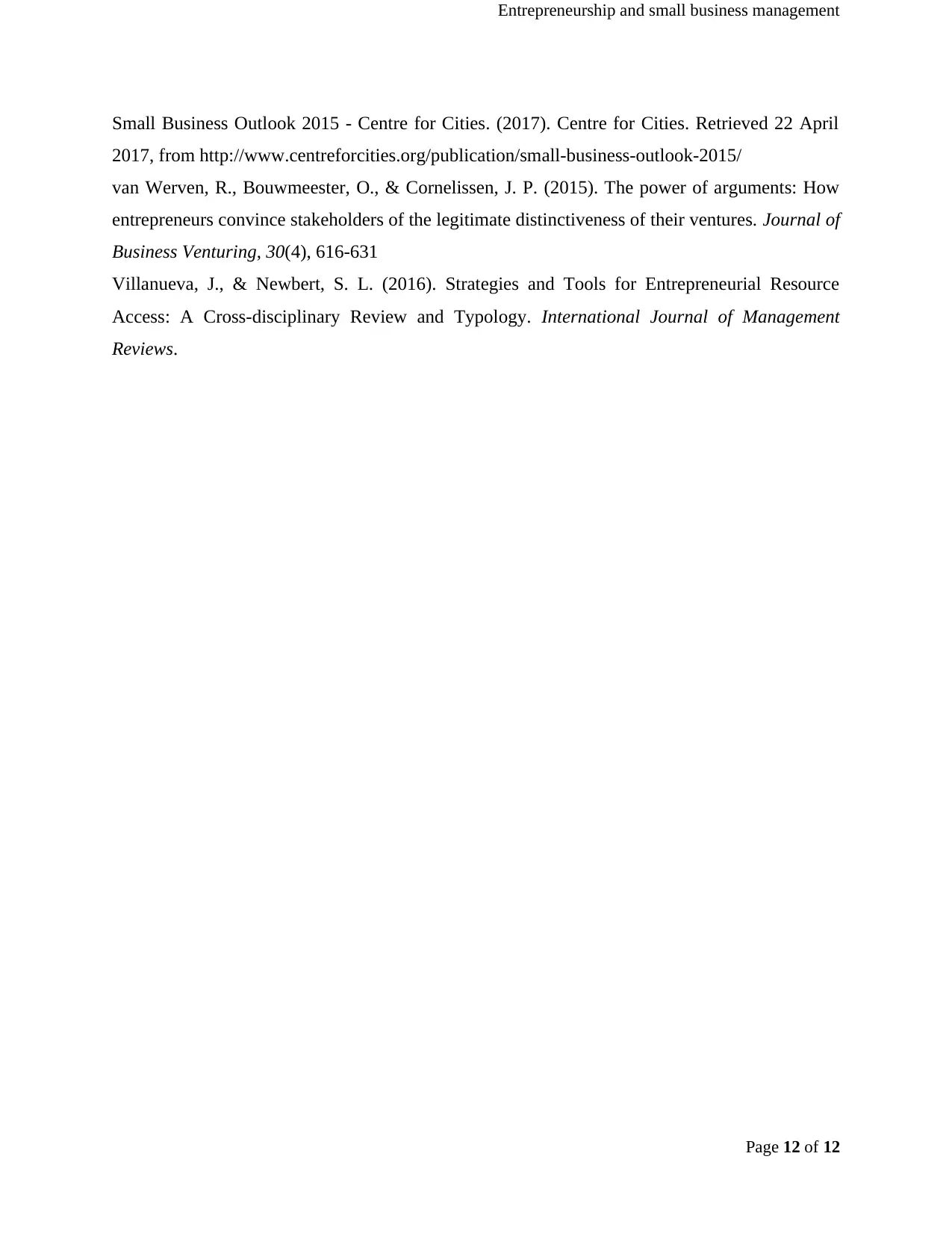
Entrepreneurship and small business management
Small Business Outlook 2015 - Centre for Cities. (2017). Centre for Cities. Retrieved 22 April
2017, from http://www.centreforcities.org/publication/small-business-outlook-2015/
van Werven, R., Bouwmeester, O., & Cornelissen, J. P. (2015). The power of arguments: How
entrepreneurs convince stakeholders of the legitimate distinctiveness of their ventures. Journal of
Business Venturing, 30(4), 616-631
Villanueva, J., & Newbert, S. L. (2016). Strategies and Tools for Entrepreneurial Resource
Access: A Cross‐disciplinary Review and Typology. International Journal of Management
Reviews.
Page 12 of 12
Small Business Outlook 2015 - Centre for Cities. (2017). Centre for Cities. Retrieved 22 April
2017, from http://www.centreforcities.org/publication/small-business-outlook-2015/
van Werven, R., Bouwmeester, O., & Cornelissen, J. P. (2015). The power of arguments: How
entrepreneurs convince stakeholders of the legitimate distinctiveness of their ventures. Journal of
Business Venturing, 30(4), 616-631
Villanueva, J., & Newbert, S. L. (2016). Strategies and Tools for Entrepreneurial Resource
Access: A Cross‐disciplinary Review and Typology. International Journal of Management
Reviews.
Page 12 of 12
1 out of 12
Related Documents
Your All-in-One AI-Powered Toolkit for Academic Success.
+13062052269
info@desklib.com
Available 24*7 on WhatsApp / Email
![[object Object]](/_next/static/media/star-bottom.7253800d.svg)
Unlock your academic potential
© 2024 | Zucol Services PVT LTD | All rights reserved.




